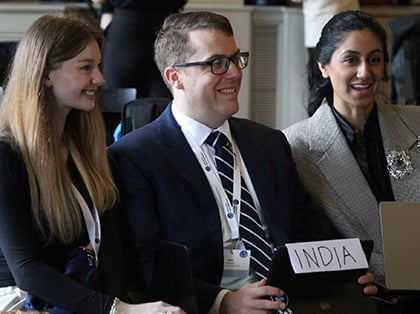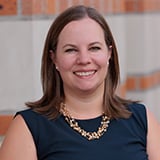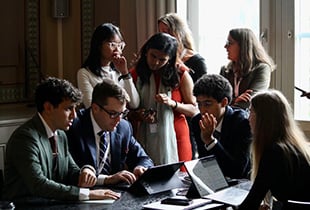How Top Schools Invest In Student Success
THIS GUIDE IS NO LONGER ACTIVE. For the current FP Guide, click here.
Rice University, School of Social Sciences
Holistic Development to Prepare Students for the World of Action

Rice University’s Master of Global Affairs (MGA) program is co-sponsored by the James A. Baker III Institute for Public Policy and the School of Social Sciences. On a wall at the Baker Institute is a quote that distills the MGA program’s ambition and approach to investing in student success: “A bridge between the world of ideas and the world of action.”
Abbey Godley, assistant dean for student programs at the School of Social Sciences, says that the MGA program serves as a bridge to the world of action through a holistic approach to student goals, program-level career support, ample opportunities in Houston, and global partnerships. “Our program is designed so that our students have a high propensity for impact when they graduate,” she says. “That means we don’t take a one-size-fits-all approach to our students.”
A holistic approach to student goals starts early, before orientation, in which incoming MGA students complete career and goal assessments before even arriving on campus. “From the start, we’re intentional with meeting students where they are,” Godley says.

“With our program, students benefit from a synergy between the theoretical and disciplinary knowledge of the School of Social Sciences professors and the applied expertise of the Baker Institute fellows.” –Abbey Godley, Assistant Dean for Student Programs, School of Social Sciences, Rice University
Currently, the MGA program has 46 students, and each receives individualized, program-level career support. As part of the two-year program, students complete four sessions of a strategic career-planning workshop in their first year and work with staff to find a required graduate field internship (GFI) in their final spring semester of the program.
Accompanying the MGA program’s career support is a $500 professional development fund and a $4,000 stipend for students with an unpaid GFI. Paired with the convenience of Rice’s location in Houston — the world’s energy capital, site of NASA’s headquarters, and home of the third-largest consular corps in the United States and 26 Fortune 500 companies — the school’s resources help students navigate into professional opportunities both in Houston and abroad. In recent years, Godley says, a former student was introduced by a Baker Institute fellow to contacts at NASA. The student used his GFI to intern at NASA in Houston, launching a career in space policy.
For students with global ambitions, Godley points to the MGA program’s new partnership with the Institute for Global Negotiation for a one-week international simulation experience at Rice’s Paris campus. The simulation will focus on real-world applications of energy policy negotiation, offering a global training ground for MGA students. “Like Houston, Paris is an authentic skill lab for understanding how corporations, governments, and NGOs can work together,” Godley says.
Applicants Should Consider Program Concentrations with a Sense of Purpose
Rice University’s Master of Global Affairs has three program concentrations: International Political Development, International Political Economy, and International Security.
Applicants are evaluated on various factors, such as having strong analytical skills. Another consideration is work experience, or having had significant international experience as an undergraduate, including study abroad, research work, or internships. For all applicants, excellent letters of recommendation and a clear sense of purpose and direction for pursuing graduate education at Rice are also admissions must-haves.
Rice University, School of Social Sciences
https://mga.rice.edu/fp25
[email protected]
713-348-2367![]()
Contents
- How Top Schools Invest In Student Success
- George Washington University, Elliott School of International Affairs
- Rice University, School of Social Sciences
- Princeton University, Princeton School of Public and International Affairs
- Augusta University, Pamplin College of Arts, Humanities, and Social Sciences
- The Fletcher School at Tufts University
- Indiana University, Hamilton Lugar School of Global and International Studies
- Columbia University, School of International and Public Affairs
- Penn State University, School of International Affairs
- Texas A&M University, Bush School of Government & Public Service
- Georgetown University, School of Foreign Service
- University of Denver, Josef Korbel School of International Studies
- Yale University, Jackson School of Global Affairs
- George Mason University, Schar School of Policy and Government
- American University, School of International Service
- Seton Hall University, School of Diplomacy and International Relations
- Johns Hopkins University School of Advanced International Studies
